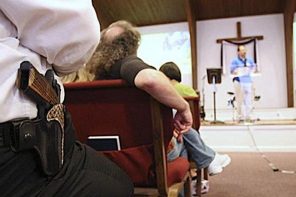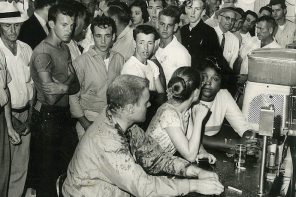There has been argument brewing in the progressive religious community as to who really counts as a “progressive,” and, by implication, whose policies and politics should be shaping the new Obama administration. Whose voice, in other words, will be heard in post-religious-right Washington?
The argument revolves around those who see themselves as truly progressive versus those who are more eager to work with religious moderates. While all this might seem like a tempest in a theological teapot to outsiders, the discussion is generating heated passions (along with some bruised egos) in the left-ward religious community.
In his April 16 article, “Will the Real Progressive Christians Please Stand Up?,” Delwin Brown introduced a very helpful historical survey into the conversation, identifying four historical antecedents to reemergent progressivism: 1) the early 19th century evangelical movement; 2) post-Civil War liberalism; 3) early-20th century neo-orthodoxy; and 4) mid-20th century liberationist movements. He placed the current discussion in this historical context, suggesting that there aren’t really divisions among contemporary progressives as much as there exists two points of view—the “purists” and the “accommodators.”
While there is much to commend in his analysis, I’m not entirely sure I agree with its conclusions. I don’t disagree because I am offended in any way. I actually disagree because I don’t fit into the schema—and I suspect many others won’t either. Over the last couple of years, I have been equally claimed by purist progressives and accommodating progressives (and equally criticized by both!) And, by theological pedigree, I have drunk deeply from the wells of all four of the historical streams of the progressive movement. So, while I found Del’s historical analysis clear and pointed, I also found it a bit baffling in relation to personal experience.
And that’s because I’m a post-modern, post-partisan, neo-pragmatic progressive pilgrim.
What do I mean by that?
In the last twenty years, a new way of being progressive has emerged—thus, Delwin Brown’s historical schema needs a fifth “phase.”
Around 1980, theology shifted when a new form of liberal theology, called “post-liberalism” began to shape a new, young generation of graduate students and seminarians. “Post-liberals” stood in the liberal tradition, and continued to emphasize God’s reign of justice, but they moved “beyond” historical liberalism in two key ways: 1) they reengaged tradition, taking the texts, scriptures, and insights of the past with a new seriousness; and 2) they emphasized the importance of spiritual practices and formation in an attempt to connect the faithful to a more transcendent and personal experience of God.
“Post-liberals” believed that old-style liberalism had, in many ways, failed. They both critiqued the hubris of inherited liberalism and developed a more pragmatic and modest approach to theology.
“Post-liberalism,” a post-modern theology, has transformed into a new sort of post-modern progressive Christianity. It moves beyond (as indicated by the word, “post”) and is subsequent to the traditional categories of liberal-and-conservative. Instead, it takes a non-dualistic, discrete, narrative, and situational approach to religion—very different from the former arguments between the Truth claims of older theological structures.
Because of its essential modesty in regard to truth (opting instead for speaking of “truthfulness” rather than Truth), it finds itself as “post-partisan” and doesn’t take sides in the old arguments. As a result, it tends toward theological pragmatism: How does one enact justice in a fallen world? With whom can the faithful make alliances for the sake of shalom in the world? It constructs the world more in terms of a journey of justice rather than a destination of truth. Hence, post-modern progressives are post-partisan, neo-pragmatic pilgrims.
And they do not fit into the categories of “purist” or “accommodator.” Like the “purists,” they are idealistic—they truly believe in God’s reign, in justice, and work (often prophetically) so that the world might be better. But, like the “accommodators,” they are pragmatic, seeing always the “both-and” (or the “and-and-and-and”) rather than the “either-or.”
Thus, part of their idealism is building coalitions and in creating conversation with people from a broad spectrum of opinion. They are idealistic pragmatists—fashioning a progressive faith that matches the longings of what cultural theorist Jonathan Pontell calls “Generation Jones,” (a group who are reshaping a host of political and social institutions)—among whom President Obama is a prime example.
Progressive religion, and the ways it is changing, must be understood within the larger frame of what many philosophers believe is a massive paradigm shift in Western culture—the shift away from modernism toward whatever post-modernism is birthing. The old categories no longer work. We are going to need an entirely different language in order to name progressivism’s new historical iteration.
The tempest-in-a-teapot argument among religious progressives is but one small microburst in the larger storm of cultural change. Those who expected a pure progressive Camelot under President Obama are bound to be disappointed—because he is a post-modern progressive. And that’s a different sort of thing than we’ve known before. History may point the direction, but we’re having to make this up as we go along. Because liberalism just ain’t what it used to be.




